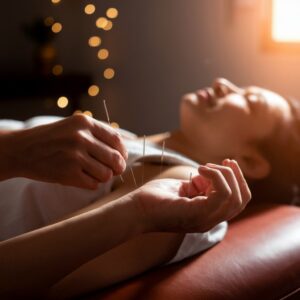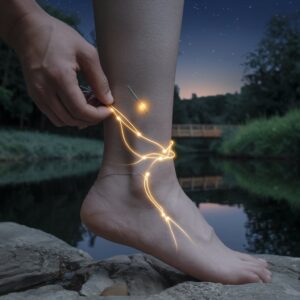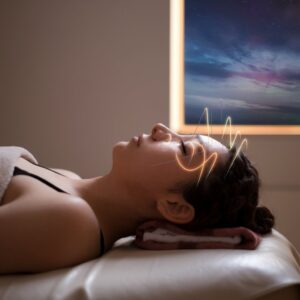Exploring Acupuncture: A Natural Approach to Combat Insomnia
Sleep disorders are on the rise in our modern, fast-paced world, affecting a significant number of individuals worldwide. If you have exhausted all options with over-the-counter drugs or lifestyle modifications to improve your sleep without much success, you might be in search of an alternative solution. Acupuncture for insomnia has become increasingly popular as a natural way to restore sleep equilibrium.
The Ancient Practice of Acupuncture and Its Modern Relevance
Acupuncture is a traditional Chinese medical technique that involves the precise insertion of thin needles into specific points on the body. These points, known as acupuncture points or acupoints, are believed to be interconnected pathways that help facilitate the flow of vital energy, referred to as Qi. By targeting specific acupoints, acupuncture aims to restore the balance of Qi and improve one's overall health.
Acupuncture is rooted in Traditional Chinese Medicine (TCM), which views health as a harmonious equilibrium within the body. This ancient practice has a history of over 2,500 years and has earned global recognition as a respected treatment method. Although abstract, the concept of Qi carries excellent significance in acupuncture. Qi is the essential energy that flows through the body's meridians. When this flow is disrupted, it can result in a range of health problems, including difficulty sleeping.
Modern research has provided compelling evidence supporting the effectiveness of acupuncture, showcasing its ability to stimulate the body's natural healing processes. By stimulating specific points, acupuncture can enhance blood circulation, energise the nervous system, and promote the release of neurotransmitters. Understanding the physiological changes that occur during acupuncture is crucial for fully comprehending its potential in effectively managing sleep disorders. Extensive research has shown that acupuncture has a significant positive effect on sleep quality. It helps to shorten the time it takes to fall asleep and promotes a longer overall sleep duration.
How Acupuncture Helps in Treating Insomnia: A Comprehensive Insight
 Regulating the Sleep-Wake Cycle Naturally
Regulating the Sleep-Wake Cycle Naturally
By leveraging the skills of an experienced acupuncturist, the sleep-wake cycle can be effectively regulated by stimulating endorphins and other neurotransmitters. This technique promotes profound relaxation and enhances the overall sleep experience. Using acupuncture, you can improve your body's energy flow and experience a more tranquil and revitalising sleep.
The sleep-wake cycle, or circadian rhythm, is a vital internal process that governs the natural sleep pattern and wakefulness over 24 hours. Disruptions in this cycle may result in difficulties falling asleep and other sleep-related issues. Acupuncture can influence sleep patterns by targeting specific points, including Shenmen (HT7), Sanyinjiao (SP6), and Anmian.
Located on the wrist, Shenmen, also known as Heart 7, can soothe the mind and relieve anxiety, which is often the underlying cause of insomnia. Situated above the ankle, Sanyinjiao, also known as Spleen 6, is believed to maintain a harmonious state between the liver, spleen, and kidneys. It is said to aid in hormonal balance and stress reduction. Anmian, located behind the ear, plays a crucial role in promoting restful sleep by assisting in falling and staying asleep.
With expert precision, acupuncture effectively stimulates the body's production of melatonin, a crucial hormone that helps regulate sleep patterns. Ensuring optimal melatonin levels can contribute to a well-regulated sleep-wake cycle, improving sleep quality and a rejuvenating morning wake-up.
Reducing Stress and Anxiety Through Acupuncture
Stress and anxiety often cause sleep disruptions. Acupuncture stimulates the parasympathetic nervous system, which can induce a state of relaxation and provide relief from stress. Creating a serene environment that promotes deep relaxation can help you sleep a restful night.
Like an acupuncture expert, the parasympathetic nervous system, also known as the “rest and digest” system, helps conserve energy and facilitates relaxation. Acupuncture effectively targets specific acupoints to help alleviate the body's stress response. Specific points on the body, such as Yintang, Baihui, and Neiguan, have demonstrated remarkable efficacy in relieving anxiety and stress.
Yintang, a commonly used acupuncture point, is well-known for its ability to reduce stress and enhance mental clarity. Baihui, also known as GV20, is renowned for its capacity to induce a sense of calm and harmony in both the mind and body. Neiguan, also known as Pericardium 6, is commonly utilised to alleviate symptoms like anxiety, palpitations, and emotional distress.
By focusing on these specific aspects, the body can naturally release chemicals that enhance mood and induce relaxation. This neurochemical response aids in reducing the heightened state commonly linked to insomnia, facilitating the attainment of peaceful sleep.
 Hormonal Balance: Acupuncture's Role in Regulating Sleep Hormones
Hormonal Balance: Acupuncture's Role in Regulating Sleep Hormones
Hormonal imbalances can cause disrupted sleep patterns. Acupuncture has shown remarkable effectiveness in targeting specific acupoints closely linked to hormonal regulation, specifically the hypothalamus-pituitary-adrenal (HPA) axis. With its deep understanding of rebalancing hormonal systems, acupuncture proves to be highly effective in tackling hormonal disturbances that may lead to insomnia.
The HPA axis is a sophisticated system that entails intricate interactions among the hypothalamus, pituitary, and adrenal glands. It has a profound effect on stress responses and circadian rhythms. Acupuncture can influence the HPA axis by targeting specific acupoints, including Zusanli (ST36), Taixi (KID3), and Guanyuan (CV4).
Located below the knee, Zusanli, also known as Stomach 36, is renowned for enhancing the immune system and alleviating stress. Situated on the inner ankle, Taixi, known as Kidney 3, is frequently utilised to promote kidney balance and regulate hormonal cycles. Located below the navel, Guanyuan, also known as Conception Vessel 4, is crucial in maintaining reproductive and hormonal well-being.
By precisely targeting specific points, acupuncture can regulate cortisol levels, the body's main stress hormone. Excessive stress has the potential to disrupt sleep patterns by leading to increased levels of cortisol. With its remarkable ability to regulate cortisol and other stress hormones, acupuncture can potentially restore a natural sleep cycle, improving both the duration and quality of sleep.
Addressing Underlying Health Issues That Cause Insomnia
Insomnia can be a sign of various health conditions, including chronic pain, digestive disorders, or respiratory issues. Through the precise placement of needles, acupuncture effectively addresses underlying conditions by targeting specific points within the body. Addressing the underlying cause is key to effectively resolving sleep disruptions.
Various chronic conditions can cause insomnia. Having a deep understanding and vast experience in the field, I am well aware of the challenges that individuals with chronic pain face when trying to find a comfortable sleeping position. Furthermore, discomfort during the night may arise from digestive disorders like irritable bowel syndrome (IBS), whereas interrupted sleep can result from respiratory problems such as sleep apnoea.
With a deep understanding of acupuncture, individuals can effectively alleviate chronic pain by focusing on essential points such as Ashis points, which indicate pain, and specific meridian points like Jianjing (GB21) and Hegu (LI4). Paying attention to the Tianjin pressure point on the shoulders can be highly effective when relieving tension headaches and neck pain. Located on the hand, Hegu is commonly utilised to alleviate pain and reduce inflammation.
Zhongwan (CV12) and Tianshu (ST25) are two acupuncture points frequently used for digestive disorders. Located on the upper abdomen, Zhongwan is essential for ensuring optimal stomach function and relieving indigestion symptoms. Tianshu is situated near the navel and can help promote bowel movements and relieve digestive discomfort.
By identifying and treating these underlying health issues, acupuncture has proven to be highly effective in alleviating symptoms and promoting a greater sense of well-being, leading to improved sleep quality.
 Enhancing Sleep Quality: How Acupuncture Promotes Deep, Restorative Sleep
Enhancing Sleep Quality: How Acupuncture Promotes Deep, Restorative Sleep
Acupuncture can potentially enhance both the onset and overall quality of sleep. Research has indicated that acupuncture can benefit the production of melatonin, a hormone that plays a vital role in regulating sleep patterns. Enhance your sleep quality for a more revitalising and peaceful rest. Experience the refreshing advantages of beginning your day with fresh energy and vitality.
Getting a good amount of deep or slow-wave sleep (SWS) is essential for rejuvenating the body and mind. Throughout this stage, the body repairs tissue strengthens the immune system and solidifies memory. Acupuncture can improve sleep quality by targeting specific points, stimulating the production of melatonin, and supporting the body's natural sleep processes.
Specific acupuncture points, such as Yin Tang, Si Shen Cong, and An Mian, are highly effective in enhancing sleep quality. Located between the eyebrows, Yin Tang is widely recognised for its soothing properties. Enhancing cognitive function and reducing mental fatigue can be achieved by incorporating Si Shen Cong, a technique focusing on four points near the top of the head. Understanding the importance of An Mian in relation to sleep patterns is crucial.
Studies have shown that consistent acupuncture sessions can positively affect different aspects of sleep. These include shortening the time to fall asleep, lengthening sleep duration, and enhancing overall sleep quality. These benefits arise from how acupuncture helps regulate the autonomic nervous system, decrease hyperarousal, and support the body's natural sleep-wake cycle.
Frequently Asked Questions
Is acupuncture painful?
Acupuncture is typically a pleasant and tolerable experience. The needles used are thin, resulting in minimum pain. People usually describe the sensation as a tingling or a little ache.
How many acupuncture sessions are required for treating insomnia?
The number of acupuncture treatments depends on the severity of insomnia, health, and responsiveness. A typical therapy comprises weekly sessions for many weeks and occasional maintenance sessions.
Are there any side effects of acupuncture for insomnia?
Most people agree that acupuncture is a safe treatment choice by a trained professional. People may sometimes have mild side effects, like brief pain or bruising at the site where the needle was inserted. If you choose a qualified acupuncturist, you can be sure that the treatment will be safe and successful.
Can acupuncture be used alongside other sleep-promoting methods?
Indeed, acupuncture may dramatically improve sleep quality. It works with other beneficial strategies, including relaxation, sleep hygiene, and lifestyle changes. Incorporating acupuncture with these approaches can boost overall efficacy, improving the likelihood of resuming a good sleeping pattern.
Is acupuncture suitable for everyone with insomnia?
An increasing number of people think that acupuncture is a safe way to treat people, even those who have trouble sleeping. However, people with certain medical conditions, like blood problems or weak immune systems, might be unable to use it. It is essential to talk to an experienced acupuncturist who can look at your case and give you specific help.
Brought To You By:
Sources:
1. Mayo Clinic. (2021). Acupuncture. Retrieved from https://www.mayoclinic.org/tests-procedures/acupuncture/about/pac-20392763
2. Spence, D. W., Kayumov, L., Chen, A., Lowe, A., Jain, U., Katzman, M. A., … & Shapiro, C. M. (2004). Acupuncture increases nocturnal melatonin secretion and reduces insomnia and anxiety: a preliminary report. The Journal of Neuropsychiatry and Clinical Neurosciences, 16(1), 19-28. doi:10.1176/appi.neuropsych.16.1.19
3. Shergis, J. L., Ni, X., Jackson, M. L., Zhang, A. L., Li, Y., & Guo, X. (2016). A systematic review of acupuncture for sleep quality in people with insomnia. Complementary Therapies in Medicine, 26, 11-20. doi:10.1016/j.ctim.2016.02.004
The Article: Acupuncture for Insomnia – Restoring Sleep Balance appeared first on Acupuncture Walton-le-Dale
The Article Acupuncture for Insomnia: Regaining Sleep Regularity appeared first on https://mcrtherapies.com
The Article Acupuncture for Insomnia: Regaining Sleep Regularity Was Found On https://limitsofstrategy.com
The Article Acupuncture for Insomnia: Regaining Sleep Regularity First Appeared ON
: https://ad4sc.com

 Hormonal Balance: Acupuncture's Role in Regulating Sleep Hormones
Hormonal Balance: Acupuncture's Role in Regulating Sleep Hormones Enhancing Sleep Quality: How Acupuncture Promotes Deep, Restorative Sleep
Enhancing Sleep Quality: How Acupuncture Promotes Deep, Restorative Sleep




Comments are closed